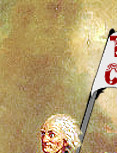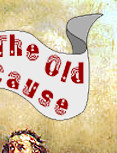WHAT
CAN WE LEARN FROM THE AUSTRIAN "CRISIS"?
On
February 14, 2000, I
suggested that our Euro-cousins ought to get their
several rights of exit clarified lest they awaken
one day to peacekeeping (that is, war) being waged
by the "good" upon the "bad,"
as decided by the actually existing socialists in
Brussels. I was fairly serious. Now the immediate
moment has passed, it might be helpful to tease out
the main threads of the "case" against Austrian
control of Austrian affairs made by our friends in
the center and the center-left.
On
February 6, Mr. Roger Cohen offered up what passes
for historical perspective at the New York
Times (see "Austria
Throws Europe a Curve"). Reading him, I wondered
if Austrians should have bothered resisting the Turks
in the sieges of Vienna, since that resistance is
one of the things behind their present bad attitude.
Another is some fellow named Hitler. Please, don’t
forget about that guy, even during the commercial
breaks. Like Fats Waller, he may not get around much
any more, but his spirit seems to be everywhere.
Cohen
calls the two world wars "collective European
suicide," which gave world power to the United
States. He attributes "much of the European slaughter"
to "permutations of nationalist or racist ideologies"
(in World War One?). This slights the role
of the modern, centralized state in creating the disaster.
Even so, Mr. Cohen is not unfair. He observes that
the Eurocrats’ line on Austria reflects their wish
"to flex their muscles on the cheap and embarrass
the right." Further: "officials who favor
a federalist Europe perceived a unique chance to advance
their cause through a new form of interference in
a member state’s affairs." Finally, the Austrian
Freedom Party threatens "the stifling 30-year
dominance of the Social Democrats and their cronies…."
GLOBALIST
AGITPROP AND BLONDE JOKES
I
do not think that Mr. Cohen was playing the devil’s
advocate here. He was just chiding the Euro-politicos
for not being as great-souled as they might be if
they worked at the Times. He drops these interesting
matters and urges upon us the pressing need for a
new "pan-European identity, able to accommodate
both Christianity and Islam." This important
project – at once inevitable and virtuous – is threatened
by European "far right" parties. Haider’s
radical evil is shown, for example, by "his odious
posters of fair and red-cheeked Austrian girls representing
the essence of his country’s goodness." Odious!
"The horror!" – as that shattered fellow
keeps saying in Apocalypse Now.
A
couple of observations might be made here. It is certain
that our major left-leaning newspapers share a Secret
Style Manual. Under "Stories about northwestern
Europe," it would say: "Writers will sneer
at hair and eye-color of local inhabitants. See also,
pp. 6-7, ‘Race, Class, and Gender.’" Maybe not.
I see this a lot in stories about Iceland (did
they vote for Hitler [Hitler]?). This gets rather
tiresome, as when earnest souls inform you that white
people are "really pink." Thanks a heap.
I’ll file that somewhere. Some people are so advanced
that they not only feel bad about it all but also
feel bad for those who don’t feel bad about it all,
but should. Takes a burden off those of us who can’t
get so enlightened.
One
guesses that Mr. Cohen is being caustic about anything
representing – for anyone – Austria’s goodness. He
has already shown that Austria has no claim on any
goodness whatsoever. Not even for yodeling? No, they
gave us Hitler. Remember Hitler? I caught you forgetting
for a second. Shame on you.
WE’D
ALL LOVE TO SEE THE PLAN
As
to the main show, it would gladden my heart to see
the working model of an identity "able to accommodate…
Christianity and Islam." Medieval Spain is sometimes
adduced as proof that Muslims in power are a tolerant
lot (unlike Christians) – tolerant provided they were
dominant. The 17th-century Viennese
weren’t willing to try the experiment and I am told
that English people get a little edgy in towns north
of London as they decline to 50% of the local population.
I remember watching odious Labour MPs from
those boroughs say on the telly that, well, that Rushdie
fellow has gone a bit too far and perhaps Her Majesty’s
Government ought to broaden the blasphemy laws to
ease the new voters’ pain. Some Tories chimed in.
But
this is not the National Front Disco and I am only
pointing out that sometimes people don’t "get
along." But see the Secret Style Manual
once more: "Writers will always ridicule natives’
fear of being swamped, especially where they are being
swamped" (hypothetical p. 20). Whether or not
mass immigration is always an unrelieved joy, a few
decrees from Brussels or Washington, backed up with
threats of force, will doubtless resolve things nicely.
No problem. No, indeed. The problem is those who think
Austria works better, as Austria, if it is mainly
made up of Austrians. For the cheerleaders of "globalization,"
such concerns, wherever found, are contemptible and
lead directly – on the hypothesis that we stand here
on the edge of a very steep slippery slope soaked
in lithium bearing grease – to fascism. And Hitler.
He does get around a bit. He was a notable defender
of particularism and local self-government. His main
achievement, if I recollect rightly, was to restrict
immigration.
COMMUNITARIANISM
WIELDED GLOBALLY
Not
to be outdone, Mr.
Amita Etzioni, the high priest of communitarianism,
weighed in with "Americans could teach Austrians
about diversity" (excuse me while I regain my
composure) in USA Today, February 14. Censure
of Austria is "utterly inadequate," he writes.
He concedes that mass immigration "is viewed,
not without reason, as threatening Austria’s
national character and identity" (my emphasis).
But then who are these Austrians to have a say in
such matters? They ain’t much, their sins are many,
and as the Haider episode shows, they are prone to
"[embrace] semifascist ideologies."
Clearly,
the Austrians in question are wrong. They shall just
have to get a new identity, or at least a new conception
of identity. Their new identity will be so broad and
friendly and diverse as to make the word needless.
Whether the new post-Austrian "Austria"
will be, in any sense, Austria, is the last thing
which should concern anyone, including Austrians.
Take it from Uncle, who presides over the happy multicultural
homeland we all think of as….. America. America? Well,
the New America, where waves of immigrants now guided
to their inevitable triumph by left-wing zealots will
forever extinguish the Bad Old America, chiefly remembered
for slavery, genocide, religious bigotry (Christianity),
strikebreakers, uptight WASPs, Latin classes, and
environmental destruction.
The
post-American America stands as the model for the
post-European Europe. Certainly, everything will be
just fine once all peoples start "accepting the
democratic way and tolerating others." And you
thought communitarianism had something to do with
actual communities! And can it be an accident – as
the Trots say – that the very same issue of USA
Today has, as a feature story, a
lengthy plaint about the Confederate flag flying over
the capitol of South Carolina? Someone identified
by name and picture – so we can’t miss the point of
her not being from around there – "doesn’t
understand the Confederate flag’s presence underneath
the state and U.S. flags." I don’t understand
it, either. Why is the U..S. flag on
the state capitol? It’s not a federal building.
But
I wander afield. Why not submit all old controversies
to juries of newcomers who know less than nothing
about them? Why not let the furthest-removed outsiders
possible decide whether Serbs ought to be irrationally
attached to the scene of some old battle? Come to
think, we just did something like that. How about
a well-paid committee, banged together at Ellis Island,
and charged with determining if white Southerners,
too, are badly in need of a new identity? We can afford
it. There’s a budget surplus! Al Gore can help: he
long ago got above his raisin', even if he hasn’t
accommodated Christianity and Islam so much as ecological
pantheism and Buddhism.
DO
STATES SOLVE PROBLEMS AS MUCH AS THEY CREATE THEM?
Probably
there is no cobbled-together, big-state-sponsored
new identity which can "accommodate"
all major differences. There might, however, be political
arrangements which could minimize problems stemming
from such differences. In Europe, liberals decided
fairly early that centralized nation-states could
secure individual liberty, free markets, religious
freedom, and so forth. With the French Revolution,
federalism became suspect because local jurisdictions,
after all, seemed the bastions of reaction. In America,
liberal republicans had to take federalism as an existing
structural fact. The outcome was not perfect, but
I would put it up against Euro-liberalism any day.
Out
of the clash between liberalism and the old regime
in Europe, large territorial states founded by monarchs
were partly "reformed" – that is, centralized
and strengthened. Some scholars see this as a fatal
shortcut by which liberalism undermined its own future.
Once socialists and nationalists arrived to dispute
control of these strengthened states, the sad course
of 20th-century history was pretty much
set. Oh, by the way, liberalism’s original goals were
not very well secured.
As
one weighs the role of the centralized state in this
century’s disasters, federalist doubts creep in. The
modern liberals, the socialists, the communists, and
the real fascists (wherever they are) don’t wish to
follow that lead. They want to steer those great-big
modern states. When ethnic or religious tensions raise
their head, a state controlled by high-toned moderns
who disdain ethnicity and religion, will wish to impose
"solutions" on the fanatics and bigots,
and down the road, re-educate their children to worship
the "neutral" but very big and bureaucratic
state.
One
disadvantage of this is that there is not much room
for freedom in these big "problem-solving"
states. That they actually cause many of the problems
while solving none is also worth looking into. Once
these big jurisdictions decide on war against the
weak or, even worse, against one another, their sheer
destructive power puts civilization itself in jeopardy
for decades at a time.
REAL
SUBSIDIARITY AND LOCAL SELF-GOVERNMENT
A
different line of attack can be derived from American
liberal and federal republicanism. Austrian School
economist Ludwig von Mises addressed these issues
in a rather American way, long before reaching these
shores. In Liberalism
(1927[1996]), he sought to rebuild, not society, but
liberalism, which had strayed far from its beginnings.
As one who grew up in the last years of the multi-ethnic
Austrian Empire, he was keenly aware of the problems
that NATO and Uncle now propose to fix from the outside
with bribery and bombing. Mises argues that adoption
of a strict laissez faire economic policy would
diffuse the national question as it existed in central
and southern Europe. It would not matter who the administrative
personnel were in a genuinely limited state – Czech,
Slovak, Hungarian, whatever. The only other approach
would be to pursue consistently the idea of self-determination
down "to every territory large enough to form
an independent administrative unit" – in principle,
down to the level of the individual, were that feasible
(Liberalism, pp. 108-121).
Note
that the two approaches are mutually compatible. Indeed,
micro-states would feel more quickly the economic
losses of protectionism and learn to shun it. Unfortunately,
neither approach is on offer these days and radical
decentralization, with or without laissez faire
will sound quite "utopian." How to get there
from here remains to be seen. But the main alternative
– endless lectures or bombings from Brussels or Washington
– hardly bears examining as a future worth having.
After this last century, Mises’ extreme decentralization
and free trade would be promising if they held out
nothing more than a drastic reduction in the casualty
figures. People would then at least be alive to
test the other parts of the program.
Does
this resolve the problems of "identity"
and immigration? Maybe not. But it does suggest directions
in which they can be defused and de-fanged. Even better,
these directions run exactly opposite to those favored
by the New York Times, and that good,
gray paper is an important heuristic device in these
things. At two tons an issue on Sunday, its only other
use has something to do with fish.









